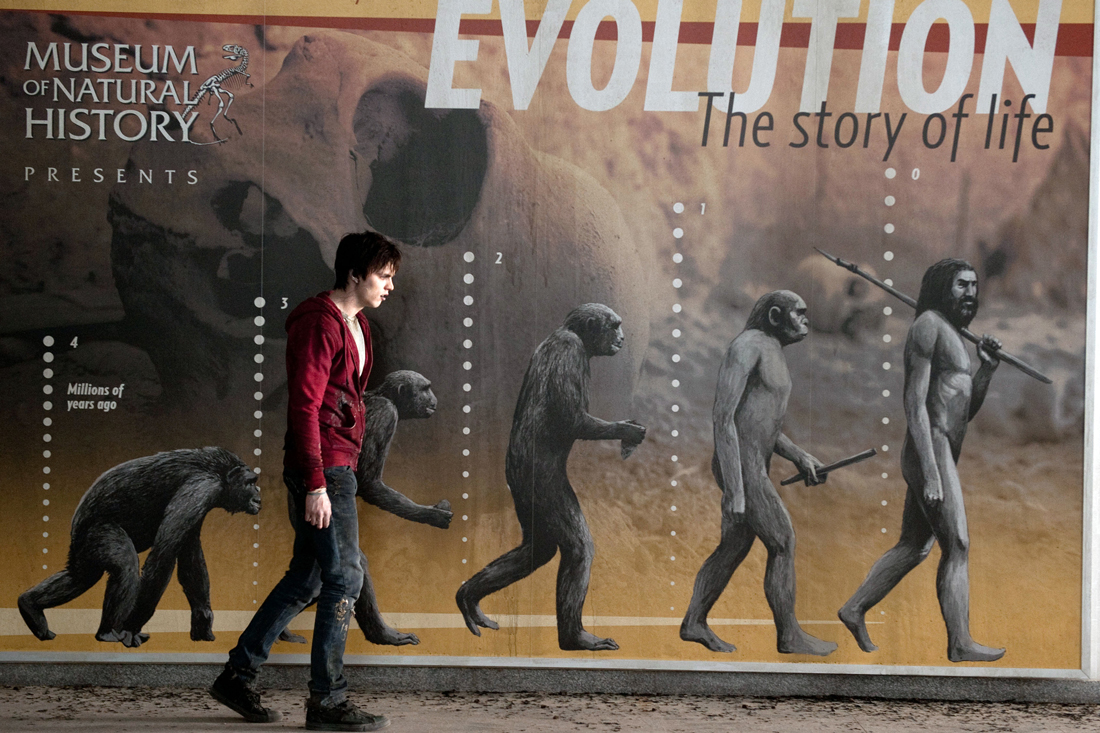The field is unexpectedly crowded when it comes to zombie movies that are funny. If Jonathan Levine’s Warm Bodies falls short of the magnificent standard set by Edgar Wright’s Shaun of the Dead and Ruben Fleischer’s Zombieland, there’s no shame in that. Levine’s entry is different because it tells its story from the zombies’ point of view, but it shares those movies’ goal of being scary, funny, and romantic all at once. Fitfully succcessful at all those things, Warm Bodies mostly proves what we already knew: Pulling off that combination is really difficult.
Based on Isaac Marion’s novel, the story takes place in a postapocalyptic America that has been overrun by zombies, with the last remaining humans having enclosed themselves in a heavily fortified, walled-off city. Our hero is a zombie (Nicholas Hoult) who refers to himself as R because that’s all he can remember of his name. He nevertheless has a remarkably active mind for a member of the walking dead, as we can hear from his neurotic interior monologue: “What am I doing with my life? Why can’t I seem to connect to other people? … I should stand up straighter. I think people would respect me more if I did that.” R is extremely bored with his new life of wandering around an abandoned airport with his fellow zombies, and the only thing that still gives him pleasure is eating people’s brains, since it allows him to absorb their memories and feel human for a short time.
That changes when he and a pack of other zombies attack a group of young humans who are scavenging for supplies. R is smitten from the moment he lays eyes on Julie (Teresa Palmer), a badass blonde who’s blowing zombies away with a shotgun. A few seconds later, after bashing in her boyfriend’s head and devouring his brain, R is hopelessly in love with her, and he hides Julie from the other zombies when she gets separated from her group. Falling in love slowly turns R back into a living person, and Julie needs to take this information back to her fellow humans — including her dad (John Malkovich), who rules the city as a military dictator — before any more zombies are killed.
This is a fantastically funny premise, so you might well wonder why it isn’t playing better as the movie unfolds. Writer-director Jonathan Levine previously helmed the cancer comedy 50/50 and the coming-of-age flick The Wackness. Levine’s strength is in gentle, insightful humor, but the material here seems to demand a wackier and more satirical comic sensibility. The filmmaker’s lack of adventurousness puts a damper on this movie, especially when it comes to the action sequences in the later going, for which Levine doesn’t show much affinity.
The material presents extraordinary difficulties for the actors, and neither of the two talented leads have ever displayed a flair for comedy. Hoult does some remarkable work in a difficult role that asks him to convey underlying emotions in a character whose exterior is literally dead. (Articulate though R is in voiceover, in real life he can barely speak.) Most of the heavy lifting is left to Palmer, and though she’s bright and fresh when called for, this unconventional romance proves to be too much for her. Even an experienced comic actor like Rob Corddry (playing another zombie who decides to turn human) looks lost, and only Analeigh Tipton seems at all sure of herself as Julie’s best friend, who is thoroughly freaked out at the idea of Julie hanging out with the undead.
The movie is best with its lyrical moments, as Levine creates some warm flashback sequences between Julie and her boyfriend (Dave Franco) and a balcony scene that cutely recalls Shakespeare’s R and Julie. Even here, though, the movie falls short in attempting to use R’s zombiehood as a metaphor for someone going through the motions of life until he’s touched by love. (Zombieland raised similar issues to much better effect.) The story’s parallels with the war on terror don’t hold up, either, and the film deviates from the book in providing a redemptive ending for Julie’s dad, which rings false and does no favors for Malkovich, who’s miscast as a hardass soldier who loves his daughter deep down.
In trying to be so many different things, Warm Bodies never settles into a groove or delivers on any of its fronts. This ambitious movie isn’t without charm, and it clearly wants to be a different sort of romantic film for Valentine’s Day. Yet it just comes out as an odd, well-intentioned misfire.
[box_info]
Warm Bodies
Starring Nicholas Hoult and Teresa Palmer. Written and directed by Jonathan Levine, based on Isaac Marion’s novel. Rated PG-13.
[/box_info]












